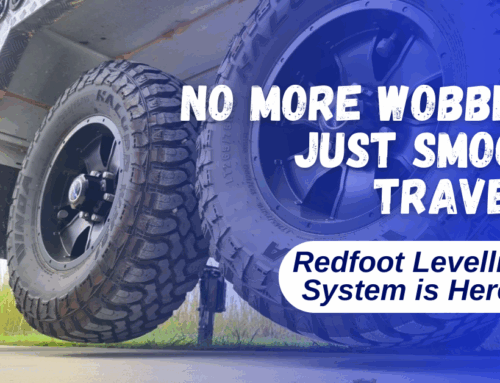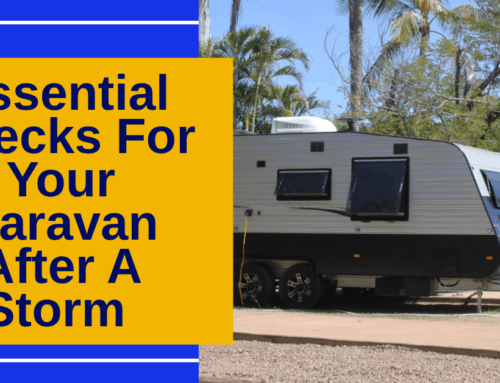Many of you would be aware that all trailers and caravans with a GVM over 750Kg are required by law to have some type of braking system. There are some exceptions to this law and it is to do with the age of the caravan (e.g vintage caravans), but for this blog we are going to assume you have a modern trailer or caravans that will require vehicles over 750Kg GVM to have an operating braking system fitted.
The 4 most common braking systems you will find on a trailer or caravan are Mechanical Override, Electric, Hydraulic Override and Hydraulic with an Electric Actuator.
Below I discuss the most common issues with each braking system:
Mechanical Override Brakes
This braking system works using inertia. When the tow vehicle has its brakes applied, the force of the trailer or caravan being towed pushes forward onto the override coupling pushing the coupling shaft back. This then makes contact with the brake lever which will pull on the brake cable. With the cable attached to the brake caliper arms, the arms are pulled forward applying pressure to the brake pads on the discs. As there are quite a few mechanical components that make up this braking system, there are a few common problems.
- Brake Adjuster – this can often rust and seize. If this cannot be adjusted, it will cause slack in the cable and take longer for the brakes to be applied. If you have ever heard a “BANG” coming from your trailer when you have applied the brakes on your tow vehicle, it is due to lack of adjustment.
- Brake Cable – this can rust and stretch over time. If the cable starts to fray, it won’t be long before it will break. If the cable breaks, you will have no brakes to slow down your trailer or caravan.
- Brake Pads – a brake pad is made up of the plate and lining. The lining will wear down over time just like a car brake pad. What you have to be aware of is if the lining tears away from the plate. This can happen if you have had your hand brake on for a period of time while storing your trailer or caravan. The lining can rust itself onto the disc meaning that when you release the hand brake, the pad will still be attached to the disc. When the wheel starts to rotate, the force of the disc turning will break the lining away from the plate leaving nothing to slow the trailer or caravan down.
Hydraulic Override Brakes
Just like the mechanical braking system, the hydraulic override system works off inertia. The difference is that instead of having an adjuster, cable and caliper arm, you have a hydraulic master cylinder, hydraulic brake line and a piston caliper.
When force is applied to the coupling, the coupling pushes back onto the cylinder arm, pushing the rod inside the master cylinder and pushing brake fluid through the hydraulic lines to the piston which pushes on the brake pads. Although I believe this is a more effective braking system than the Mechanical Override Brakes, it can still have common problems.
- Seized Master Cylinder – If the master cylinder is seized, it will not push brake fluid down to the calipers.
- Leak In Hydraulic Brake Line – Most late model trailers and caravans are now using a flexible stainless steel brake hose which will only leak if the line has been cut by something or one of the fittings had sprung a leak. If your trailer or caravan has a copper brake line it can rust over time causing the line to become brittle, crack and leak.
- Caliper Piston – If any of the above 2 issues occur, it can affect the caliper piston. If there is no fluid pushing the piston, the piston will seize and the ring inside the caliper and caliper rubber boot can crack which can also lead to leaks.
- Brake Pads – like the mechanical override brake pads, these can rust onto the disc if the hand brake has been left on for a period of time as well as wear down over time due to usage.
Hydraulic Over Electric Brakes
By using an Electric Actuator, hydraulic fluid is pushed through the hydraulic lines to the caliper piston and applies pressure to the brake pads. The amount of pressure applied is regulated through a brake control unit fitted in the tow vehicle. By adjusting the brake control unit in the tow vehicle, you can apply the correct amount of force needed to brake your trailer or caravan effectively without over or under braking. As this system relies on an electrical feed to work the brakes, there are additional problems that can occur apart from the hydraulic braking issues.
- Trailer Plug – if there is corrosion in your trailer plug, it can cause an interruption in power being delivered to the actuator which would mean the brakes won’t work
- Break Away Battery – unless you have an actuator that works off compressed air, your trailer will have a break away system which includes a backup battery. This battery needs to be fully charged every time you tow. If it is flat then the actuator won’t work. It is a common problem that can be easily fixed with a new battery or placing the battery on charge when you have finished towing. Most tow vehicles are fitted with an auxiliary power wire that will constantly charge the battery while you’re towing.
- Leak In Brake Line – Most late model trailers and caravans are now using a flexible stainless steel brake hose which will only leak if the line has been cut by something or one of the fittings had sprung a leak. If your trailer or caravan has a copper line, it can rust over time causing the line to become brittle, crack and leak
- Caliper Piston – If any of the above 2 issues occur, it can affect the caliper piston. If there is no fluid pushing the piston, the piston will seize, the ring inside the caliper and caliper rubber boot can crack which can also lead to leaks.
- Brake Pads – like the mechanical override brake pads, they can rust onto the disc if the hand brake has been left on for a period of time as well as wear down over time due to usage.
Electric Brakes
Electric brakes are made up of a number of components fitted to what we call a “Backing Plate”. The backing plate consists of:
- Brake Shoe
- Electric Magnet
- Brake Lever
- Adjuster
Electric brakes require a brake control unit to be fitted to the tow vehicle for the brakes to work. The electrical feed runs through to the magnet that will magnetize against the inner face of the brake drum which will pull the brake shoes out and force them to make contact with the inner sides of the drum to slow the caravan or trailer down. Below are the common issues with this braking system
- Trailer Plug – the trailer plugs pins and wire can corrode over time which can affect the power going to the brakes.
- Brake Shoes – these will wear down over time due to usage.
- Lack Of Adjustment – if your electric brakes aren’t adjusted in an appropriate time period, the brake shoes will wear down to a point that they are not making contact with the brake drum. This will then lead to an even bigger issue (refer #4)
- Electric Magnet Wears Down And Shorts – When your brake shoes stop becoming the force that stops / brakes your trailer or caravan, your electric magnet will become the sole component that will slow you down. This can create an expensive problem as it can create heavy scoring to the inner face of your drums. It will also wear your magnet down past the wear indicators and in extreme cases it can short out your electric braking system and melt your wires.
A common concern customers have that use electric brakes is when one wheel is hotter than the other. Most people think that there is a problem with the side that is hot. 9 times out of 10 this issue will be with the side not heating up. Brakes need to get hot. If they don’t then your brakes aren’t working effectively.
Brakes are an essential part of towing. You must make sure that before you take off on your holiday or just towing in general, your brakes are working the way they should be. It is better to be safe than sorry so make sure you have your brakes serviced and adjusted within the timeframe your trailer or caravan manufacturer recommends.





